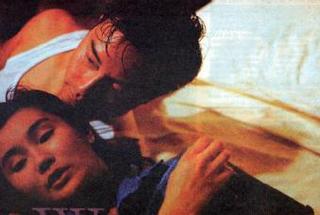When great expectations are not met
A Review on ‘Days of Being Wild’
By Paul Fonoroff

IT WOULD be difficult for any film to live up to the expectations generated by Days of Being Wild.
Director Wong Kar-wai (fresh from his critically-acclaimed As Tears Goes By) has assembled those elements ~ including excellent technical credits, a star-studded cast and a huge budget ~ which would seem to guarantee a production worthy of the title "film of the year", if not the decade. That it falls far short of expectations is due chiefly to an imbalance of form over content.
There is no denying that this is an exquisite film to look at. Chris Doyle's cinematography and William Cheung's art direction have helped recreate the feel of Hongkong in 1960. This is all the more amazing when one realises that there is not one extra in these Hongkong scenes, which are populated entirely by the main cast members.
Without resorting to milling crowds in period costumes or fleets of period cars. Days of Being Wild produces the illusion of that era through little details. A phone booth in the rain, a crate of soft drink bottles, a huge clock, or faded room furnishings establish the time and place far more powerfully than, say, a spectacular recreation of the old Star Ferry Pier.
This is a film of muted colours, of close-ups and medium shots rather than extreme long shots. By being consistent in his visual approach, Wong has not only created his own little universe but one which is consistent with the world in which his protagonists reside.
Unfortunately, these protagonists are nearly as colourless as the overall visual scheme. With so many stars packed into its 90-minute running time, the script lacks focus.
Leslie Cheung appears to be at the centre of things, a ne'er-do-well who seduces and abandons women, most notably a concession stand worker (Maggie Cheung) and a nightclub dancer (Karina Lau). These women find Cheung the most fascinating man in their lives but since we are privy to little beyond his pretty face and propensity for cruelty, it is difficult for a viewer to understand just what arouses such strong emotions.
It is certainly not his repartee, which lacks sparkle and verges on the self-important. The most interesting facet of Cheung's psychological make-up is his warped relationship with his Shanghainese step-mother (an impressive performance by Poon Dik-wah).
Poon's is the most interesting character in the picture but we are given only tantalising bits that hint at the depths lurking behind her mascara-laden eyes.
Less delineated is Cheung's best friend (Jackie Cheung), whose appearance is so brief that it should have been labelled as a "special guest role". Policeman turned-sailor Andy Lau fares little better.
Of the two girlfriends, Karina Lau's character is the flashier. She all but steals the film and a brief sequence of her demonstrating her "kooch" dance to Jackie Cheung is a mastery of bravado masking a certain vulnerability.
If the entire film lived up to this moment, it would be a classic. But it feels like three hours worth of leisurely-paced character-sketches trimmed down to an hour and a half, with the result that too much is omitted.
Towards the end, the structure further breaks down when the location shifts from Hongkong to the Philippines. It is as if Wong suddenly realised that time was running out and he had to get on with the story. The outcome is emotionally confusing.
Days of Being Wild is like a long preamble which never really leads to anything ~ although this is probably because a sequel is promised for 1991.
1990-12-23
